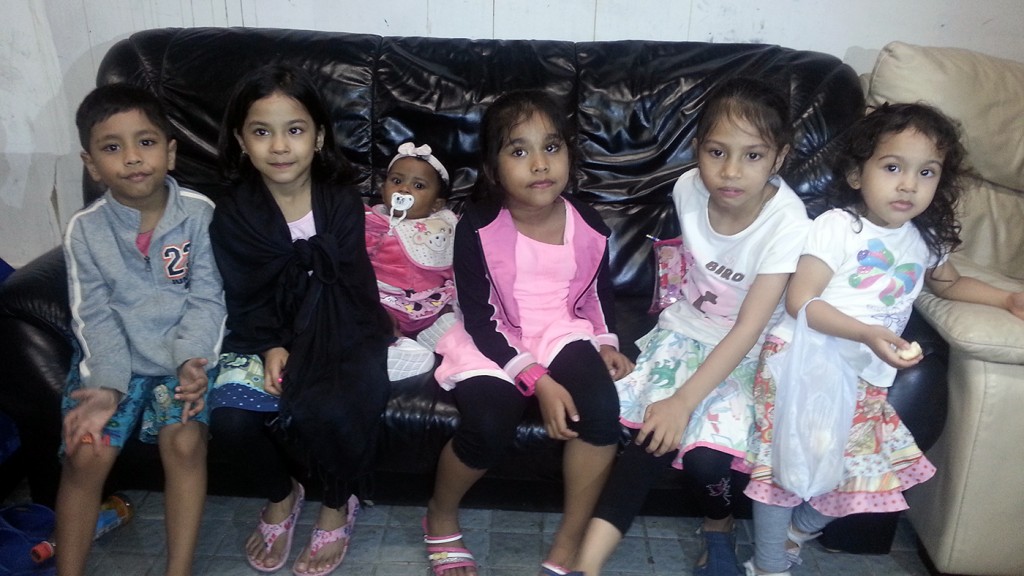
Difficulties start for refugee children before they are born and compound sharply during the rest of their stay in Hong Kong with no end in sight. Information about their age groups is not publicly available, so there is no official data on the number of refugee children and newborns. There are about 300 minors among Vision First’s 1600 current members, approximately 18%.
Vision First reports the following: as a direct consequence of stringent asylum and border policies, many children suffer early parental separation when relationships break down and one parent is left to care for the child, typically the mother. Single-parent children seem to outnumber those born to married refugee couples. Both groups face a specific set of hardships and the first challenge is obtaining a birth certificate from the Registrar of Births and Deaths.
1. Parents of newborns are asked an apparently innocent question: “What is the nationality of your baby?” This question however hides innumerable problems. Let’s say for instance the parents fled Mozambique. The child is technically stateless as the embassy would not have been notified for protection reasons. However, parents are pressed for a specific answer, or else birth certificates cannot be issued. The correct answer should be “stateless” and Hong Kong is a signatory to the UN Convention Relating to the Status of Stateless Person.
2. The housing, food, clothing and medical troubles faced by refugee children are largely the same as those encountered by adults, although there is a shortage of milk formula and an absence of diapers for babies. As welfare assistance is provided within a system that seems to encourage voluntary departures, it is here that refugees are caught in the middle and punished for being born in an undesirable family. It is debatable whether the authorities have taken children’s needs duly into account when formulating assistance policies across the board.
3. Problems grow exponentially after children enter the schooling age, which generally start at 3 years old, when most resident children attend kindergarten. It warrants repeating that refugees are not allowed to work and should therefore receive full cost wavers from the authorities that do not normally deny the right of children to attend school. What happens at hospitals should also happen at schools, with refugee parents necessarily exempt from all payments.
Following our advocacy work, we are glad that the authorities began waving kindergarten school fees starting from August 2014. Nevertheless scores of children are denied essential early education because some refugee parents are unable to prepay school fees from August to December prior to subsidy payments. Further, kindergarten uniforms, books, bags, transportation and meals are additional costs not covered by fee remissions. Such onerous burdens force desperate parents to scramble for cash, which might include working illegally, thereby risking arrest and imprisonment.
Financial difficulties at primary and secondary schools are lessened by full fee remission, allowances for books and internet and partial transportation refunds. However, piecemeal policies expect destitute parents to pick up the bill for many essentials, such as uniforms (about 2000$ each for winter and summer), shoes, school bags, meals, actual transport fees (including accompanying parents for younger kids), stationary as well as countless miscellaneous fees.
The cost of these shortcomings is expensive in human terms. Not only is there the grave issue of the criminalization of working refugees, but there is also the widespread vilification and humiliation of inadequately supported families. For instance, children are teased for having used books (something they get over), but they fall sick wearing summer uniforms during winter months. Refugee children eat bread and jam, not lunchboxes (something they overcome), but might skip two or three days of school a week for lack of bus money. Cutting government support short causes countless deleterious effects generally unnoticed and unreported.
It is hard to witness parents wipe tears of shame recounting how they feel they let their children down. There is little comfort parents can give children who return home to ask, “The kids teased me because I don’t have winter uniform and didn’t have lunchbox. What should I tell them, mummy?” as we were recently told. If the government is serious about stringently banning refugee work, it should at least be consistent in deploying policies that fully support refugee children’s compulsory education. Otherwise, refugees should be allowed to work for the time they need to pay school costs.
It is hard to understand contradicting government policies that punish refugee children through their most vulnerable years. In the long run few benefits will accrue and no savings will be made by authorities who will eventually have to deal with scores of stateless children that could have been treated with a little more foresight and a lot more respect.


